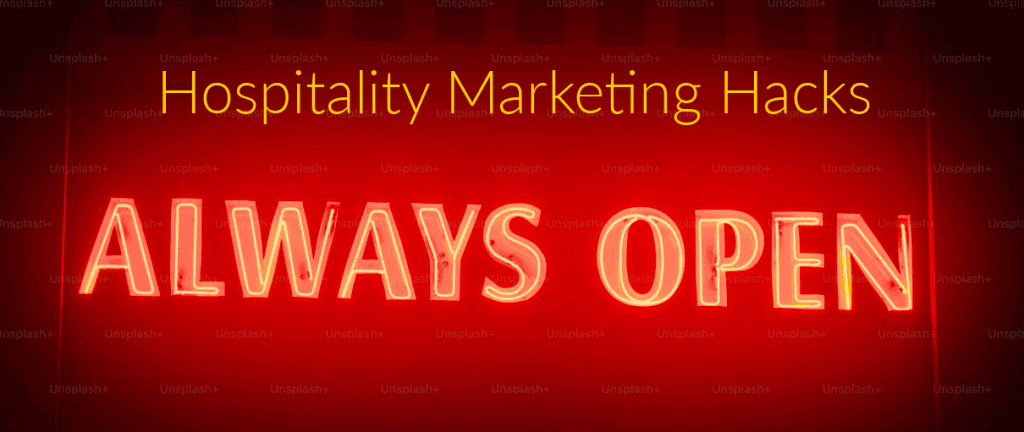
In today’s competitive hospitality industry, businesses must adapt to rapid changes and proactively shape guest experiences through strategic marketing. As of 2023, 60% of hospitality businesses report that digital marketing has become their primary tool for reaching new customers, reflecting a significant shift toward online engagement.
With 85% of travellers using mobile devices to book travel activities, the importance of targeted digital strategies has never been more apparent. This article explores innovative marketing hacks tailored for the hospitality sector, designed to maximise visibility, improve guest interactions, and drive customer loyalty. From understanding your market to leveraging the latest technological tools, these strategies will empower you to craft a compelling marketing narrative that resonates with modern travellers.

Understanding Your Market
The foundation of any successful marketing campaign is a deep understanding of your audience. Conducting thorough market research lets you identify your potential customers’ demographic details, preferences, and behaviours. Use surveys, social media analytics, and guest feedback to gather data – this will allow you to segment your audience and tailor your marketing messages more effectively.
Content Marketing
Content is king in digital marketing, and this holds especially true in hospitality. Create compelling content that captures the essence of your brand and the experiences you offer. For example, a seaside resort might publish blog posts about local beach activities, share professional photos of sunset views from their rooms, or produce video tours showcasing their spa and dining facilities. Storytelling can be particularly effective as it connects emotionally with potential guests and sets you apart from competitors. A boutique hotel, on the other hand, could tell the story of its historic building’s origin or share guest stories and experiences through a monthly video series.
Email Marketing
Emails remain one of the most effective ways to reach customers directly. Use email campaigns to send updates, promotional offers, and personalised recommendations to your guests. Craft catchy subject lines like “Unlock Secret Deals at [Hotel Name] This Summer!” and other engaging content to improve open and click-through rates. Remember, personalisation is key—segment your email list to ensure the right messages reach the right people. For instance, you could send a tailored email with dining credits to guests who eat at your property’s restaurant frequently.

Leveraging Reviews and Testimonials
Positive reviews are gold in hospitality. Encourage satisfied guests to leave reviews on popular platforms like TripAdvisor and Google. For example, a city hotel might send a follow-up email thanking guests for their stay and inviting them to review their visit. Actively respond to both positive and negative reviews to show that you value customer feedback and are committed to improving service. Featuring guest testimonials on your website and other marketing materials can also boost credibility and trust. Display quotes from happy guests prominently on your homepage or in a dedicated testimonial section.
Partnerships and Collaborations
Collaborating with local businesses or influencers can significantly extend your reach. Consider partnerships that align with your brand and that can upgrade your guests’ experience. For example, a resort could team up with local tour guides to offer exclusive guided hikes or historical tours, or a city hotel might collaborate with nearby restaurants to provide special dining packages for guests. These partnerships not only offer guests added value but also promote local tourism and community connections.
Loyalty Programs
Design loyalty programs that reward returning guests and encourage them to book directly with you. Innovative rewards, such as discounts on future stays, free upgrades, or exclusive experiences, can increase guest loyalty and promote repeat business. For instance, a hotel chain might offer tiered reward levels, where higher tiers unlock perks like late check-outs, access to a private lounge, or free event tickets. Analyse the success of your programs regularly to ensure they meet your guests’ expectations and your business goals. Use feedback and data analytics to refine the offers, ensuring they remain attractive and competitive.
Embracing Technology for Innovative Marketing
Embrace the latest technological advancements to streamline your marketing efforts. Leveraging modern tech tools can greatly increase the effectiveness of your marketing strategies and help you better connect with customers.
- CRM Systems:
- Personalisation at Scale: Use CRM systems to collect and analyse customer data, enabling personalised marketing campaigns that can target specific guest preferences.
- Efficiency in Communication: Automate communications for booking confirmations, pre-arrival instructions, and post-stay thank you notes, ensuring consistent interaction with guests.
- Artificial Intelligence (AI):
- Customer Behaviour Insights: Deploy AI tools to analyse behaviour patterns and predict trends. This will help you create offers that anticipate guest needs.
- Chatbots for Instant Engagement: Implement AI-driven chatbots on your website and social media to provide instant responses to guest inquiries, improving customer service and freeing up staff for other tasks.
- Augmented Reality (AR) and Virtual Reality (VR):
- Virtual Tours: Offer potential guests VR tours of your property, giving them a realistic preview of their experience.
- AR Navigation: Modernise guest stays with AR features that help guests find their way around your property or explore local attractions in advance.
- Data Analytics:
- Optimise Marketing Spend: Analyse which marketing channels bring the most ROI and adjust budgets accordingly.
- Guest Segmentation: Use data analytics to segment guests based on their spending patterns, preferences, and previous feedback, tailoring marketing strategies to different segments.
Measuring Success
To gauge the effectiveness of your marketing strategies, track key performance indicators (KPIs) such as website traffic, conversion rates, and customer engagement levels. Use analytic tools to assess your marketing tactics and refine them for better results.
- Website Analytics:
- Traffic Sources: Identify which sources (organic search, social media, email marketing) are driving the most traffic to your website.
- User Behaviour: Track metrics like page views, average time on site, and bounce rates to understand how users interact with your site.
- Conversion Rates:
- Booking Conversion: Monitor how many website visits convert into bookings and identify pages where you lose potential bookings.
- Email Marketing Conversion: Analyse the effectiveness of different email campaigns by tracking open rates, click-through rates, and conversion rates.
- Social Media Insights:
- Engagement Metrics: Evaluate likes, shares, comments, and other engagement metrics to measure how well your content resonates with your audience.
- Campaign Performance: Track the performance of paid and organic campaigns to determine your social media ROI.
- Customer Feedback:
- Surveys and Reviews: Regularly collect and analyse feedback from surveys and online reviews to gauge guest satisfaction and identify areas for improvement.
- Net Promoter Score (NPS): Use NPS to measure customer loyalty and the likelihood of guests recommending your hotel to others.
- Performance Dashboard:
- Unified View: Create a dashboard that integrates data from various sources (CRM, website, social media) to give a unified view of your marketing performance.
- Real-Time Adjustments: Use the dashboard to make real-time adjustments to campaigns, maximising marketing effectiveness and ROI.
Implementing these marketing hacks will not only help you attract new guests but will also improve the overall guest experience, encouraging a greater sense of loyalty and satisfaction. Always remember, the best marketing strategy is one that remains flexible and responsive to customer needs and industry trends.
Curious about how these strategies tie into overall hotel management? Or find yourself asking what is hotel management? Learning more about the fundamentals can provide deeper insights into how marketing integrates with other aspects of running a successful hotel.
